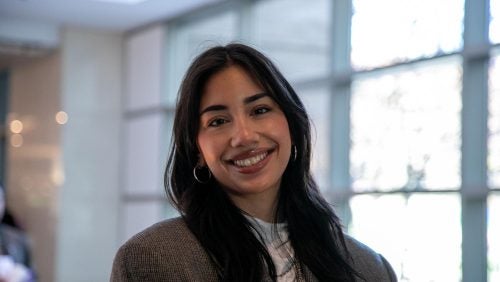My Clinic Win: Promoting Ethical AI for Lawyers with the Intellectual Property and Information Policy Clinic
August 7, 2025

Sophia Ceniza, L’25
Growing up in Atlanta, Sophia Ceniza, L’25, was fascinated by the city’s pivotal role in the Civil Rights Movement and its artistic and cultural heritage — an interest she carried with her as a law student hoping to explore the intersection of legal advocacy and artistic expression.
During her 2L year, Ceniza took part in Georgetown Law’s Intellectual Property and Information Policy Clinic (iPIP), in which students work on sociotechnical legal issues for artists, nonprofits and coalitions.
“I felt really strongly that the clinic could be a place where I found my intellectual and professional home in law school,” she says. “I didn’t have a conventional tech lawyer background, but I found that my voice still had value and that my perspective was meaningful. If it weren’t for the clinic, I’m not sure I would have had the opportunity to feel that kind of empowerment.”
Here, Ceniza reflects on what it was like to develop a framework for the use of artificial intelligence (AI) in clinical legal education, presenting her findings to faculty and how her clinic experience shaped her career path after graduation.
“I was assigned to work on behalf of our client, Georgetown Law’s clinical programs, with my iIPIP clinic partner, Olivia Luongo, L’24. Right now, there’s an AI frenzy everywhere, but especially in the legal field, where law schools, firms and students are tackling how, if at all, to use AI in their work. Georgetown came to us and asked: Is there a meaningful way that we should be integrating AI into our clinical pedagogy?
After considering different clinical education approaches and the purpose of client-centered and “justice ready” lawyering, we decided to conduct a survey among clinical faculty, fellows and students to try to understand their relationship to AI — and technology more broadly — and get a sense of their needs.
In the survey, we also asked about some of the important ethical concerns that are part of clinical practice, such as maintaining confidentiality and considering political, social and economic factors when counseling clients. Our goal was to understand how the clinics felt about these concerns and how existing AI technology potentially interacts with different ethical priorities.
To do so, we used a methodology called the SLATE method — short for sustainability, labor, accessibility, transparency and ethics — developed by iPIP Director Professor Amanda Levendowski Tepski as part of her forthcoming book How Lawyers Can Shape Good Technologies (University of California Press, 2027). Our goal was to empower individual clinics to take an audit and oversee the integration of AI-based technologies into their pedagogical practice based on the priorities that they indicated were most important in their work and communities.
Based on our findings, Olivia and I created an AI best practices guide that we shared with the clinical programs and adapted into a presentation for clinical faculty. We also presented a publicly available version of our survey methodology and suggestions for developing a best practices guide at the Legal Innovation and Technology Conference at Suffolk University in Boston, which was an amazing experience.
During law school, and the 1L curriculum especially, you learn a lot about lawyering as a litigator. Through the clinic, I learned that lawyers also play an important role as counselors who help their clients navigate ethical and regulatory frameworks. In a way, the project became a postgraduate job for me: In the fall, I’ll start a legal fellowship with EqualAI, a nonprofit dedicated to finding justice-minded ways to integrate AI into legal practice and society more broadly, with the ultimate intention of reducing bias.
My hope is that all lawyers, and particularly lawyers who come from backgrounds that are historically underrepresented in the technology field, will leverage and utilize their voices in the conversation about AI ethics. Something so wonderful about the clinic was how it taught me that your background shouldn’t prevent you from taking chances that spark your curiosity.”
Georgetown Law offers the country’s largest and most highly regarded clinical education program: Every year, more than 300 students participate in our 17 different clinics. Under the supervision of faculty and fellows, they have the opportunity to engage in real-life lawyering. In this series, students share their “clinic wins” — the large and small accomplishments that came through their clinic experiences.